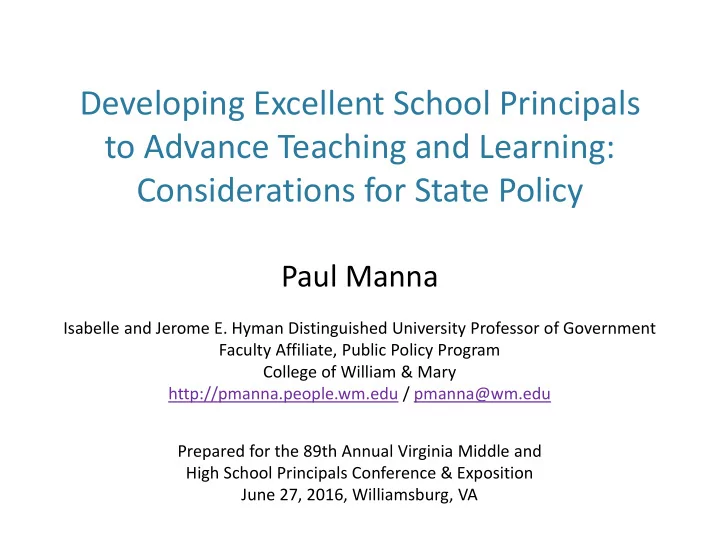

Developing Excellent School Principals to Advance Teaching and Learning: Considerations for State Policy Paul Manna Isabelle and Jerome E. Hyman Distinguished University Professor of Government Faculty Affiliate, Public Policy Program College of William & Mary http://pmanna.people.wm.edu / pmanna@wm.edu Prepared for the 89th Annual Virginia Middle and High School Principals Conference & Exposition June 27, 2016, Williamsburg, VA
2
3
4
Three main topics in the report: 1. Principals and the state policy agenda 2. State policy levers to cultivate and support excellent principals 3. The key role of state and local contexts in developing principals
1. Principals and the State Policy Agenda Overall priority: Principals are a relatively lower priority on state education policy agendas compared to other topics. Comparison to teachers: Policymakers and advocates in states give more attention to teacher ‐ related issues than principal ‐ related issues. Muddling roles: A focus on “school leadership” conflates the principal’s role with the roles of other school leaders.
2. State Policy Levers Setting principal standards Recruiting aspiring principals Overseeing principal preparation programs Licensing principals Principal professional development Evaluating principals
8
3. State and local contexts that bear on policy implementation Features of education governance and how authority is distributed in a state Diversity of locales where state policy is implemented Capacity of state agencies and local districts and schools to carry out policy Prevailing state and local policies and practices that demand the time of principals
Source: http://www.wallacefoundation.org/knowledge-center/Pages/Developing- 10 Excellent-School-Principals.aspx
Guidelines for Uniform Performance Standards and Evaluation Criteria for Principals Approved by the Virginia Board of Education on February 23, 2012, effective July 1, 2013. Revisions Approved on July 23, 2015 1: Instructional Leadership 2: School Climate 3: Human Resources Management 4: Organizational Management 5: Communication and Community Relations 6: Professionalism 7: Student Academic Progress Source: http://www.doe.virginia.gov/teaching/performance_evaluation/ guidelines_ups_eval_criteria_principals.pdf 11
Discussion starters “Principals are powerful multipliers of effective teaching.” Implication: Supporting principals is not a zero ‐ sum game with other state priorities. “Policy is as practice does.” Implication: Begin state policy discussions with an understanding of ground ‐ level practices. “Which laws will I need to break today to lead my school?” Implication: Before adopting new policies, consider an audit of current state policies that bear on the principal.
Questions and discussion For additional follow ‐ ups, you can reach me at: Paul Manna Department of Government College of William & Mary pmanna@wm.edu http://pmanna.people.wm.edu/ The Wallace report and additional resources are at http://www.wallacefoundation.org/knowledge ‐ center/Pages/Developing ‐ Excellent ‐ School ‐ Principals.aspx
Recommend
More recommend